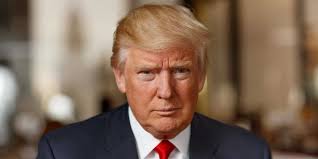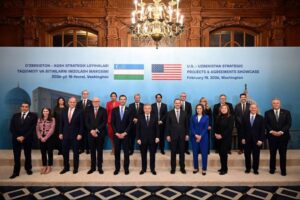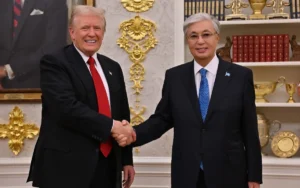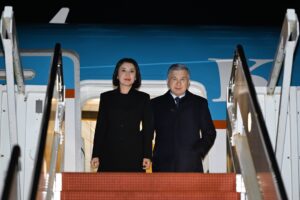Trump Reportedly Preparing Executive Order to Ease Sanctions on Syria Amid Transitional Shift

Washington, D.C., The Gulf Observer: Former President Donald Trump is reportedly preparing to sign an executive order that would ease U.S. sanctions on Syria, according to two sources familiar with the matter. The anticipated move follows Trump’s announcement during a May visit to the Middle East, where he pledged to lift all sanctions on Syria in recognition of recent political developments.
During his regional tour, Mr. Trump held discussions with Syrian President Ahmed al-Sharaa, who leads the country’s new transitional government, established in March following the collapse of the Assad regime. The fall of the long-standing government came amid a decisive offensive by opposition forces, ending a 13-year-long civil war.
The transitional government has for months appealed to the U.S. administration for sanctions relief, arguing that the punitive measures have severely hampered efforts to pay civil service salaries, rebuild war-torn infrastructure, and revive the collapsed healthcare system.
While the forthcoming executive order is expected to address several sanctions, some provisions dating back to 1979, when Syria was designated a state sponsor of terrorism, would require Congressional action to be fully lifted. Sanctions imposed under the Syria Accountability Act of 2003, signed by then-President George W. Bush, targeted the Assad regime for its alleged support of terrorist organizations, presence in Lebanon, development of weapons of mass destruction, and involvement in oil smuggling and Iraq-based militancy.
The most severe sanctions were introduced in the past two decades in response to human rights abuses and support for groups designated by the U.S. as terrorist entities. Many of these measures include secondary sanctions penalizing third countries for engaging in commerce with Syria.
The policy shift coincides with growing support for normalization from key U.S. allies, including Turkey and Saudi Arabia. Both nations have extended humanitarian aid to Syria’s new government, and Riyadh has reportedly offered to cover portions of Syria’s international debt — actions that previously risked violating U.S. sanctions. Saudi Arabia views the new Syrian leadership as a potential ally in reshaping the regional balance of power, particularly in light of Syria’s past alliance with Iran under the Assad regime.
Sanctions relief was also a focal point in recent discussions between Syrian officials, including Central Bank Governor Abdelkadir Husrieh, and global financial leaders during the IMF and World Bank Spring Meetings held in Washington last month.
The anticipated executive order signals a major shift in U.S. policy toward Syria, reflecting the changing political landscape in the country and broader regional realignment. However, analysts note that the complex legal framework of existing sanctions will require coordinated legislative and executive action for comprehensive relief to take effect.


